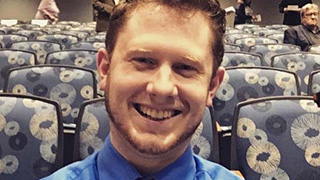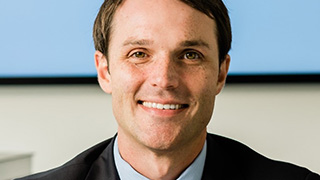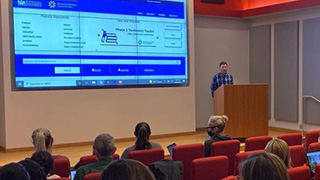Mining Medical Answers Through Library Literacy: IHS Librarians Support Ph.D. Programs at the IHS Campus
Thursday, January 11, 2024

Kyle Downey, IHS Library
Seton Hall University is well-known for its exceptional library resources, which support and foster research opportunities across the University’s academic disciplines. The Interprofessional Health Sciences (IHS) library, housed on the Nutley campus, is invaluable to scores of aspiring or continuing health sciences professionals in Seton Hall’s unique Health Sciences Ph.D. program. As one of only two programs of this kind offered in the state of New Jersey, it has three available tracks, over 80 students are currently enrolled, and the IHS research support services are critical to its growth.

Chris Duffy, IHS Library
Under the expert leadership of Associate Dean and Founding Director of the IHS, Christopher Duffy, with dedicated support from Health Sciences Librarian, Kyle Downey, this arm of the Seton Hall University Libraries was founded in 2018. “It was an
opportunity to build the new library to support a brand-new campus, a brand-new medical
school, and to support the current programs at Seton Hall,” recalled Duffy. Both
Duffy and Downey worked in the same hospital system prior to academia, but each made
a career pivot to join Seton Hall.
Duffy and Downey’s prior work as librarians in a hospital gave them both a lot of
hands-on experience with practicing clinicians in the field. “We'd dealt with clinicians
who were going back to school for their master's degree or Ph.D.,” recalls Downey,
“so I took that experience of the struggles that they were having [as students] while
also being employed at the hospital and tried to jump ahead of that to get [Seton
Hall students] to feel like, 'I'm ready'."
Both emphasize the value the Seton Hall library system provides students and faculty.
“The library is a major component for research services at all levels of education,
and especially at the post doctorate level,” says Downey. “As librarians, we work
with faculty and students to help them with their research at all the different steps
of their research process. Many students may have been out of school for several
years (or decades).” Librarians like Downey, alongside senior administrators like
Duffy, can help students distill large amounts of available information so that they
find the right research for everything from papers through thesis topics and related
research.

Kyle Downey in the classroom at IHS
"One of the big initiatives being taken, from a library perspective, is increasing
information literacy sessions with the Ph.D. students in all years,” said Downey.
“This includes going into more specific research needs such as population level statistics,
prevalence, and incidence data, finding and gathering information from government
and professional organizations.” He also notes the growing importance of including
AI and its issues in academic exploration.
While Duffy oversees the library operations, “I do all the hands on, on the ground
kind of work,” says Downey. He notes that an understanding of differentiated students’
needs is key. “These students are full-time employed, [and] have families, so most
of the classes are scheduled later in the evening,” noted Downey. And, with just 3
to 7 students per class, they provide a very intimate and focused approach to graduate
education, something Seton Hall does exceptionally well.
Downey, in his direct support of nursing students doing research, teaches citation
management through Zotero, the resource Seton Hall uses for this purpose. Christopher
Duffy recalls that nurses who have worked with Downey have cried with gratitude, he
says, “because they're so excited about the resources that are available to them that
they didn't have when they initially went to undergraduate school many years ago.”
The IHS library in Nutley is supported by the data services team at the South Orange
campus, which can help students with any of the quantitative or qualitative research
support that they may need. “As librarians increase their involvement with Ph.D.
programs (in our case SHMS and CON), we can demonstrate how the importance of the
research conducted by our students contributes to the overall academic and research
environment of the university,” says Downey. “We already have a digital repository
of research that students (and faculty) add to on a yearly basis. This information
is often referenced, cited, and viewed from various locations around the world. It
also increases the use of interdisciplinary research, which is a big focus in the
health sciences and nursing.”
Duffy and Downey’s team develop research tools for students in collaboration with
faculty, notably the Ph.D. toolkit, which Duffy calls “a one-stop-shop resource for students, so that they have easy
access to all of the resources from the library.”
Genevieve Pinto Zipp, Ed.D., Program Director, Ph.D. in Health Sciences and Director, Center for Interprofessional
Education in Health Sciences in the Department of Interprofessional Health Sciences and Health Administration, says faculty are especially grateful for IHS library support of the school’s students.
“The Seton Hall University librar(ies) provide essential resources which support our
Ph.D. in Health Sciences doctoral program mission and enables our students to successfully
achieve program goals,” says Zipp. “Given that doctorly prepared health science professionals
must respond to critical needs in the areas of academia, organizational leadership,
advanced clinical practice, and healthcare research, the expertise offered by Research Data Services personnel have served as a critical guide for our students to find, manage, analyze,
and visualize their data.”
Visit the Interprofessional Health Sciences Library's website to learn more about resources offered.
Categories: Health and Medicine
